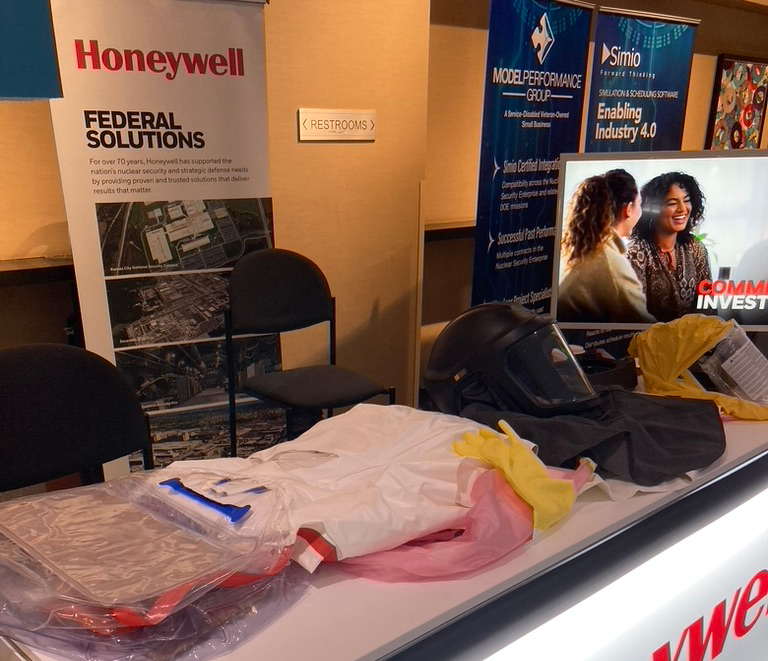Part III: The Nuclear Ban Treaty
What does the nuclear weapons industry talk about when they’re together? I spent three days with 530 government officials, politicians, and corporate contractors in a hotel basement to find out. The first two parts of this piece, “Articles of Faith” and “Follow the Money,” described some of the themes they addressed, like danger, “deterrence,” government funding, and obstacles to the mission to “modernize” the US nuclear arsenal. Here are some more:
Theme 9. The Nuclear Ban Treaty is misguided.
There was only one mention of the Treaty on the Prohibition of Nuclear Weapons (TPNW), which was adopted at the UN in 2017 by 122 non-nuclear countries fed up with the existential danger that the 9 nuclear-armed countries perpetuate. Everything to do with the Enterprise’s product is illegal in the 68 countries that have ratified so far.
But Pranay Vaddi, Special Assistant to President Biden, prefers the 1970 Nuclear NonProliferation Treaty (NPT), which has been promising nuclear disarmament “in good faith” and “at an early date” since it was ratified by the five nuclear-armed nations 53 years ago. Vaddi told the Summit he thinks the NPT is working because there are only four more nuclear-armed countries now: “That small number is a sign of success!” If the goal is non-proliferation, one could agree that four is better than 100. But the danger to life on Earth continues to grow.
Asked about the TPNW, Vaddi said, “We want the non-nuclear weapon states to [appreciate] the benefits of the NPT and not be distracted by what seems like a fake promise by the TPNW, which does not [include] a verification regime and ultimately does not serve our interests.”
In fact, Article 8, paragraph 1(b) of the TPNW assigns the creation of “measures for the verified, time-bound and irreversible elimination of nuclear-weapons programmes” to the States Parties after ratification.
Jay Tilden of the NNSA was even more dismissive of the TPNW: “The challenge for the entire liberal democratic world is to convince some of these non-aligned and third world countries, that are out there floating, many of which are part of this ban treaty. You can see them being irritated. It looks like we’re going the wrong way. [Our challenge] is to convince them that, if this all falls apart, what comes after, if it’s crafted by Russia and China, do you think that’s going to be beneficial to you?”
In fact, some of the 68 “floating” States Parties to the TPNW are Nigeria (7th largest population in the world), Bangladesh (8th), Mexico (10th), Philippines (13th), plus Austria, Ireland, South Africa, and Thailand. Indonesia (4th) and Brazil (6th) have signed the TPNW and are expected to ratify soon.
Furthermore, the leaders of the G20 nations – including the US, China, and Russia — stated in November 2022 that “the use or threat of use of nuclear weapons is inadmissible. The peaceful resolution of conflicts, efforts to address crises, as well as diplomacy and dialogue, are vital. Today’s era must not be of war.” The G20 members represent about 85% of the global GDP and 2/3 of the world’s population.
“Threat of use” is “deterrence” in a nutshell. “Inadmissible” to the G20, it’s also prohibited under the TPNW.
The TPNW is intended to eliminate the need for the “deterrent” in the first place. Then the Enterprise wouldn’t have to convince an entire workforce to get excited about an industry that can end civilization. Safety regulations wouldn’t get in their way. They’d still have to clean up seriously contaminated sites, but at least they wouldn’t be creating new ones. Of course, they’d have to find another way to make a living.
Theme 10. Peaceniks are cute but need to be kept out of the building.
A handful of protesters chatted with the Summit attendees, until the police made them leave.
They distributed a flyer that cited the TPNW, the growing worldwide divestment from the nuclear weapons industry, and “reputational risk” to the corporations: “The public…is asking: Is this patriotism or profiteering? Is this deterrence or delusion?” It mentioned that “AECOM and Serco have recently left the nuclear weapons business – not unlike GE, Westinghouse, Dupont, Morton, Ford and others did at the end of the Cold War, due to public opprobrium.” It asked, “is there a way to stay profitable with a more popular product, like in the growing market for climate solutions?”
Said one protester, “Look, you are good, hardworking, brilliant people with the best of intentions, and paid extremely well, but each day this industry takes us to the edge of life. We need your talent and expertise for really important matters.” Said another, “If you see everybody as the enemy, it’s a self-fulfilling prophecy.”
One Summit attendee saw the protesters and said, “I’m glad it gives them something to do.” Another thanked them, without irony, for expressing themselves nonviolently. Yet another brought them chocolate truffles.










